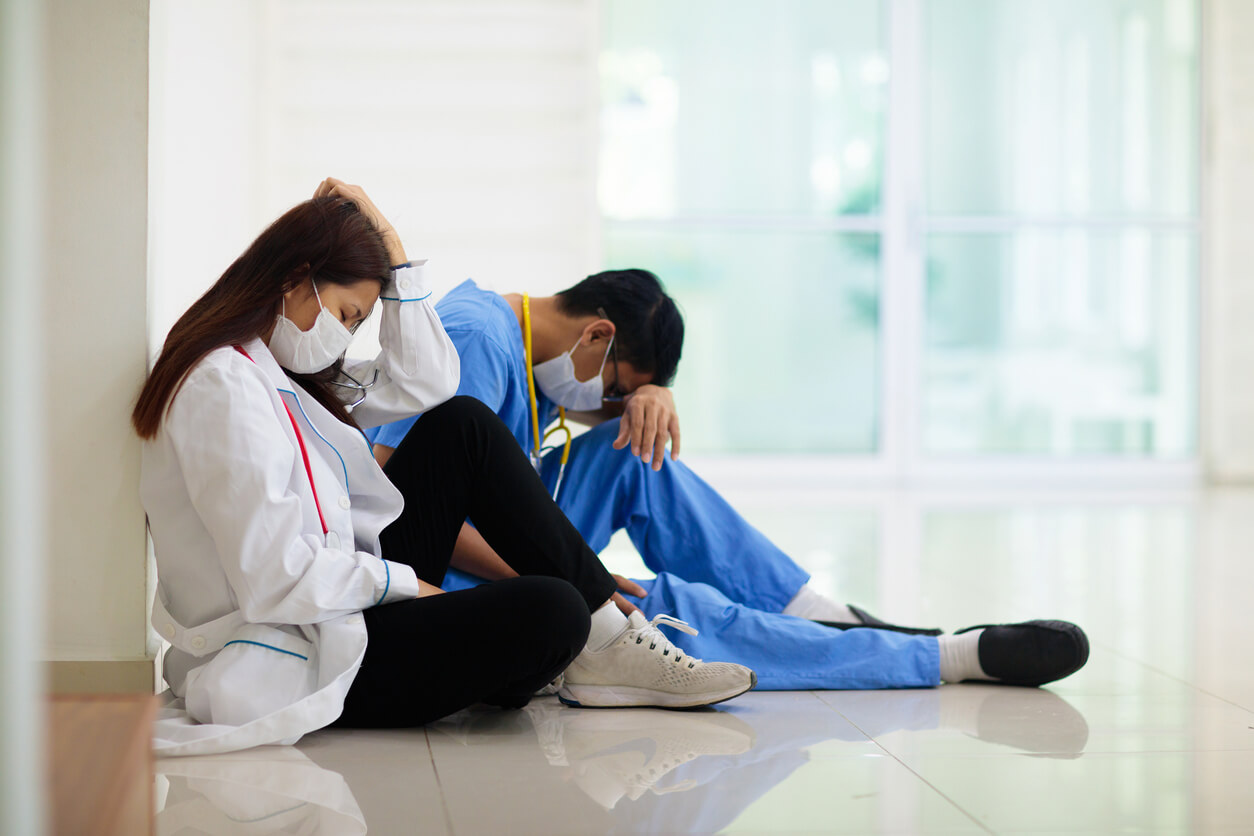Burnout Syndrome in Healthcare Professionals

In the modern era marked by unexpected pandemics and overwork, stress can become a daily feeling that ultimately has consequences for people’s health. Keep reading to find out what burnout syndrome is, how it affects healthcare professionals, and what strategies can be employed to mitigate the effects of this condition.
High cortisol levels during long working hours can cause many healthcare experts to experience this syndrome. Because of their direct contact with patients and the high burden of involvement with each case, they usually generate great emotional exhaustion that ends up isolating doctors and nurses little by little.
What is Burnout Syndrome?
According to information from psychologist Christina Maslach and psychologist Susan E. Jackson in their Maslach Burnout Inventory Manual, Burnout syndrome is defined as a progressive loss of concern and emotional feeling towards the people with whom one works. It’s something that generates dehumanization of the environment and isolation of patients.
This job burnout is characterized by three negative behaviors that affect the social relationships of those who suffer from it. The first is emotional exhaustion, which is both physical and mental fatigue; the second is depersonalization, which leads to a deplorable change in attitude towards colleagues and people with whom one works; and finally, lack of personal fulfillment, where low productivity, loss of motivation, and irritability stand out.
It’s important to clarify that mental and emotional well-being are paramount among healthcare workers. Because of the seriousness of the situations that arise in an emergency room, qualified personnel are required to enable patients to remain calm, even when dealing with difficult people who make medical care complex.
How does Burnout syndrome begin?

Other factors that generate stress and burnout in health experts include dealing with difficult patients or those with serious illnesses who discredit their work or have rude attitudes. In addition to the limited time that can be devoted to each case due to understaffing, poor relationships with their support teams, and abusive work schedules due to global emergencies.
As a recent example, the COVID-19 pandemic has proven to be a challenge for healthcare professionals, as it not only generated unprecedented work stress in modern history that caused inevitable medical burnout, but also left many nurses and physicians immersed in feelings of sadness and depression as they observed the millions of lives stolen by this disease.
3 tips to preventing Burnout Syndrome in healthcare professionals

Sometimes, stress is an inevitable part of life. However, there are several tips that can be of great help to stay calm and avoid falling into intrusive thoughts that only harm our workday. From simple guidelines such as being more aware of breathing, to studying for a Master’s in Public Health to learn how to cope with this type of ailment and help others to overcome it.
Here are some keys to prevent burnout syndrome.
1. Learn to relax by controlling your breathing
Although it seems easier to read it than to practice it, learning to use breathing to your advantage is a great life tip. So, try to do some deep, conscious breathing several times during the day. For example, before you go to the hospital and start your work day and before you go into an office to see a new patient, breathe calmly to relax and focus your attention on a specific task.
2. Try to lead a healthy life
A healthy diet, constant physical activity, and at least 7 hours of rest every night are essential to fulfilling our work responsibilities. Therefore, even though sometimes the day may be a little burdensome, make time for yourself and practice good habits. Remember that reading a book, enrolling in a new class, or sharing with family and friends are activities that help recharge us physically and emotionally.
3. Be empathetic with others and don’t isolate yourself in a bubble
All healthcare professionals must work as a team to achieve the fastest and most efficient results with their patients. Because of this, keep in mind that there’s strength in unity and you’re not alone against the world. Don’t isolate yourself from others and try to be empathetic to all your colleagues and patients. Sometimes, all that a sick person needs to continue their journey is a sincere smile from their caregivers.
Burnout syndrome can cause anxiety and depression
As the Spanish Society of Psychiatry reports, healthcare professionals need to take care of themselves in order to continue caring for others and spread health.
Despite the fact that sometimes situations arise that generate momentary stress, it’s important to deal with these episodes so as not to fall into emotional exhaustion that can cause anxiety and depression and thus be able to perform their work as well as possible.
All cited sources were thoroughly reviewed by our team to ensure their quality, reliability, currency, and validity. The bibliography of this article was considered reliable and of academic or scientific accuracy.
- Albaladejo, R.; Villanueva, R.; Ortega, P.; Astasio, C.; Domínguez, V. (2004). Síndrome de Burnout en el personal de enfermería de un hospital de Madrid. Revista Española de Salud Pública, 78(4), 505-516.
- Maslach, C.; Jackson, SE. (1996–2016). Maslach Burnout Inventory Manual (Cuarta ed.). Menlo Park, CA: Mind Garden, Inc.
- Restauri, N.; Sheridan AD. (2020). Burnout and Posttraumatic Stress Disorder in the Coronavirus Disease 2019 (COVID-19) Pandemic: Intersection, Impact, and Interventions. JAm Coll Radiol. 2020 Jul;17(7):921-926. doi: 10.1016/j.jacr.2020.05.021. Epub 2020 May 27. PMID: 32479798; PMCID: PMC7250786.
This text is provided for informational purposes only and does not replace consultation with a professional. If in doubt, consult your specialist.








